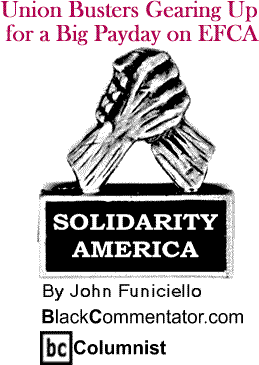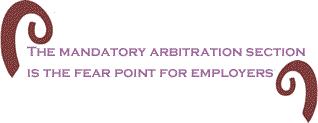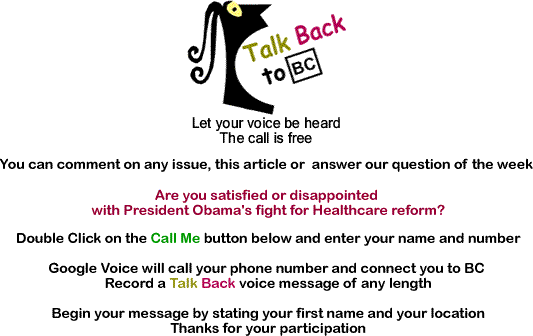
|
||||||||||||||||||||||

|
|
 |
|
Union busters are set to come out of the woodwork over consideration by the U.S. Senate of the Employee Free Choice Act, the law that would make it a little easier for Americans to organize unions in their workplaces.
A trade newspaper for the trucking industry, Transport Topics,
reported early this month that union busters warned a gathering
of fleet executives in Peter Kirsanow, a former member of the National Labor Relations Board, now a member of a Cleveland law firm, reportedly told the gathering that all previous U.S. labor laws combined “…probably don’t have the kind of impact the Employee Free Choice Act may have.” The
mandatory arbitration section is the fear point for employers. Under
current law, even if workers organize, there is no requirement that
management reach an agreement, ever. Rather, they can “surface bargain,”
that is, they can sit at the bargaining table and talk about Often, when that happens, a decertification petition is circulated sometime soon after the first year and the fledgling union is fighting for its life just to survive, let alone getting a first contract.
Although the right to form unions is enshrined in American law and in the Universal Declaration of Human Rights - which a majority of the world’s nations endorses - organized labor is one of the first institutions that corporations, armies, and corrupt politicians go after in trying to wrest control of a nation. Unions
in the Perhaps
the hysteria of American business interests over EFCA is warranted
to a small degree, because even a watered-down version will give
workers a boost and could indeed change the corporate landscape.
Kirsanow told the gathering in No
doubt, some of the thousands of union-busting firms in the It has been tough times for workers and unions for many years and EFCA would level the playing field somewhat. The late Marty Levitt, author of Confessions of a Union Buster, underwent a transformation after he had been engaged in the nefarious profession for 20 years of his adult life. He
was moved to repent, to admit the underhanded methods that were
almost universally used by union busters to stop workers from representing
themselves at the bargaining table. He said that, in 100 campaigns,
he only lost five to union workers. That’s how difficult it is to
organize a union against the power of the employer and the army
of consultants waiting to crush their efforts to gain a measure
of equality in the workplace. Levitt made the rounds of union meetings
and conventions, speaking wherever he could to inform people of
the kind of class war that was under way in When the research assistants were organizing several years ago at the State University of New York at Stony Brook, through the Graduate Student Employees Union Local 1104 (Communications Workers of America), they estimated that the union-busters were charging about $800 an hour. Also, they pointed out during their campaign that, the Research Foundation, part of the SUNY system, retained 50 percent of the grants received by professors throughout SUNY. One of their demands was that SUNY not use that grant money to try to break their effort to organize a union. There are thousands of ways for employers to deny workers’ rights under U.S. labor law and they will use as many of them as possible - or they can afford - especially in the coming weeks when EFCA is being considered, first in the Senate, then in both houses of Congress. Richard Trumka, elected president of the AFL-CIO in September, has said that he has not given up on card check and some observers believe that there is a slim chance that it will be restored to the final bill. Corporate
Everybody is getting into the act of thwarting unionization of workers. In addition to the usual crowd - U.S. Chamber of Commerce, National Association of Manufacturers, National Federation of Independent Business, and all of the right-wing think tanks - there are ever new manifestations of opposition. Something called Agriculture for a Democratic Workplace formed last spring to oppose EFCA, consisting of 40 groups in agribusiness, all very concerned that their largely underpaid and exploited workers would lose their right to an election if EFCA (if card check were included) became the law of the land. That is, of course, on the few occasions when the same employers allowed an election to be held at all. The
world in which we find EFCA being debated is much the same as in
the past several generations: Employers have most of the power and
the workers have little. Corporate EFCA is creating a lot of employment…for union-busting consultants, not many of them with the honesty and integrity to admit what they are doing to their fellow Americans, as Marty Levitt did. Ultimately, he was sorry for what he did. Union-busters of today, if they are sorry for anything, are sorry that they can’t make more money doing what they do. BlackCommentator.com Columnist, John Funiciello, is a labor organizer
and former union organizer. His union work started when he became
a local president of The Newspaper Guild in the early 1970s. He
was a reporter for 14 years for newspapers in |
|
|
|
 |
|
Any BlackCommentator.com article may be re-printed so long as it is re-printed in its entirety and full credit given to the author and www.BlackCommentator.com. If the re-print is on the Internet we additionally request a link back to the original piece on our Website. Your comments are always welcome. eMail re-print notice
If you send us an eMail message we may publish all or part of it, unless you tell us it is not for publication. You may also request that we withhold your name. Thank you very much for your readership. |
|
| |
|
| October
22 , 2009 Issue 347 |
|
| Executive Editor: Bill Fletcher, Jr. |
| Managing Editor: Nancy Littlefield |
| Publisher: Peter Gamble |
| Est. April 5, 2002 |
Printer Friendly Version
in resizeable plain
text format or pdf
format. |
 |

|
| |
| |






























 This
is the time for the employer to turn loose its “union avoidance”
consultants - union busters - and let them go to work, showing that
the union can’t do anything for them and, even so, they’ll still
have to pay dues and maybe, someday, go on strike. They’re good
at this and, today, the union busters often are hired even before
any sign of a union organizing campaign, to size up the workers
and see where the weak spots are and how the rank-and-file can be
divided without making it look as if the boss did it.
This
is the time for the employer to turn loose its “union avoidance”
consultants - union busters - and let them go to work, showing that
the union can’t do anything for them and, even so, they’ll still
have to pay dues and maybe, someday, go on strike. They’re good
at this and, today, the union busters often are hired even before
any sign of a union organizing campaign, to size up the workers
and see where the weak spots are and how the rank-and-file can be
divided without making it look as if the boss did it.
 Even
worse, in the employer’s view, the union could for the first time
have access to workers, in the workplace on the same days that the
boss addresses the workers.
Even
worse, in the employer’s view, the union could for the first time
have access to workers, in the workplace on the same days that the
boss addresses the workers.











